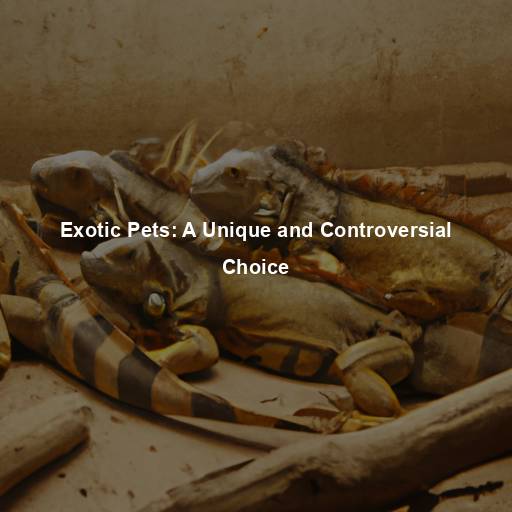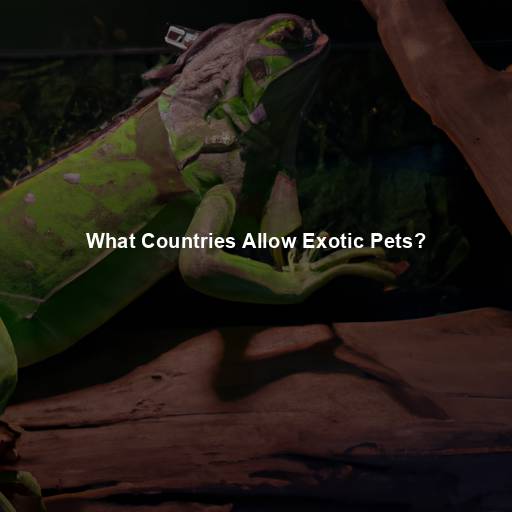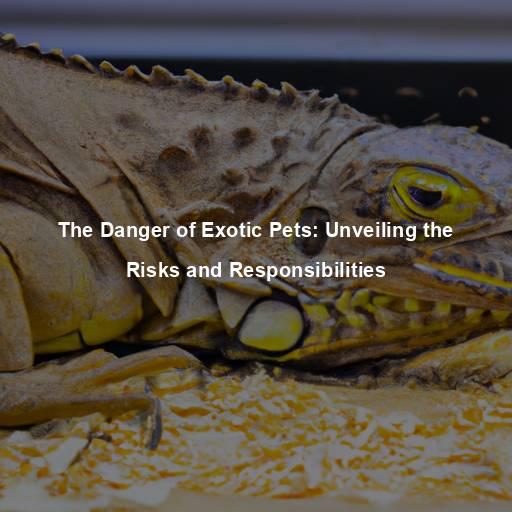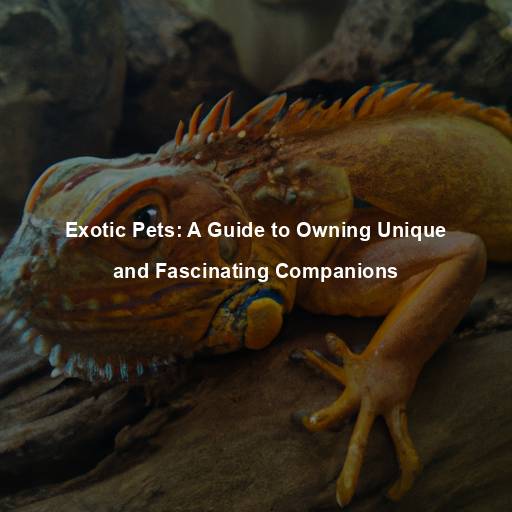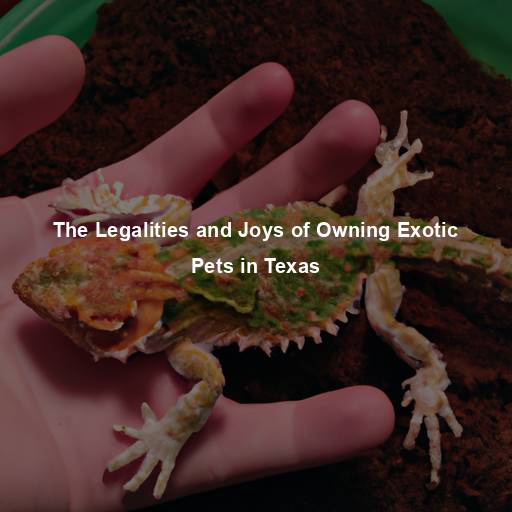Exploring the World of Exotic Pets: What Animals Can You Legally Own?
Last Updated on November 19, 2023 by Evan
Contents [hide]
- 1 The Fascination with Exotic Pets
- 2 A Complex Legal Landscape
- 2.1 United States: A Patchwork of Regulations
- 2.2 Europe: A Tapestry of Regulations
- 2.3 Asia: Diverse Regulations
- 2.4 Key Considerations for Exotic Pet Ownership
- 2.5 Research and Education
- 2.6 Responsible Breeding and Sourcing
- 2.7 Veterinarian Care
- 2.8 Commitment and Longevity
- 2.9 Ethical Considerations
- 2.10 Housing and Enclosure Requirements
- 2.11 Diet and Nutrition
- 2.12 Socialization and Enrichment
- 2.13 Zoonotic Diseases and Health Risks
- 3 The Controversy Surrounding Exotic Pet Ownership
- 3.1 Wildlife Conservation Concerns
- 3.2 Animal Welfare and Mistreatment
- 3.3 Potential Risk to Ecosystems and Native Species
- 3.4 The Appeal of Exotic Pets
- 3.5 Legal Considerations for Exotic Pet Ownership
- 3.6 A Closer Look at Exotic Pet Regulations in Different Regions
- 3.7 The Responsibilities of Exotic Pet Ownership
- 4 FAQs: What Exotic Pets Are Legal to Own?
- 4.1 What is considered an exotic pet?
- 4.2 Are all exotic pets legal to own?
- 4.3 What factors determine the legality of owning an exotic pet?
- 4.4 Are there specific exotic pet laws that I should be aware of?
- 4.5 How can I find out which exotic pets are legal to own in my area?
- 4.6 Can I obtain a permit to own a prohibited exotic pet?
- 4.7 What are some commonly owned legal exotic pets?
- 4.8 Why are some exotic pets illegal to own?
The Fascination with Exotic Pets
Exotic pets have always captivated our imagination and stirred our sense of wonder. From the majestic beauty of tropical birds to the playful antics of small primates, these unique creatures have an allure that is hard to resist. As animal lovers, we often dream of sharing our lives with these extraordinary companions, but before embarking on such an adventure, it is essential to understand the legalities surrounding exotic pet ownership.
A Complex Legal Landscape
Navigating the realm of exotic pet ownership can be as unpredictable as a whirlwind adventure. It’s a perplexing patchwork of rules and regulations that weave a web of diversity across different regions. Before setting your heart on an unconventional companion, it’s imperative to embark on a thorough quest for knowledge, unmasking the intricacies of local laws. Together, let us embark on a captivating journey, revealing the enigmatic tapestry of exotic pets that you can legally welcome into your world.
United States: A Patchwork of Regulations
When it comes to exotic pet ownership in the United States, the landscape can be quite perplexing. The laws vary greatly from state to state, leaving pet enthusiasts in a state of bewilderment. While some states have stringent regulations in place to ensure the safety and well-being of both animals and their owners, others seem to have a laissez-faire approach, leading to a burst of pet possibilities. It is crucial to navigate this complex terrain by seeking guidance from local authorities, like the Department of Fish and Wildlife, who can shed light on the enigmatic rules in your particular region.
Did you know that when it comes to hedgehogs as pets, the legal landscape is quite baffling? While it’s perfectly fine to own these prickly creatures in states like Arizona, Maine, and Wyoming, there are a handful of states that don’t share the same enthusiasm. California and Georgia, for instance, have imposed legal restrictions on hedgehog ownership, leaving potential pet owners tangled in a web of perplexity. It’s a puzzling situation that highlights the burstiness of regulations surrounding these adorable yet enigmatic little creatures.
Step into the mesmerizing world of sugar gliders, those enchanting creatures that have captured the hearts of many. While these irresistible marsupials have found themselves embraced by the warmth of legality in states such as Florida, Texas, and Pennsylvania, the perplexing reality remains that they face a forbidden fate in the picturesque states of California and Hawaii. This burst of contrasting regulations sprinkles both intrigue and mystery on the path of these delightful companions, leaving us with an undeniable sense of wonder.
Thinking about getting a ball python as a pet? You’re not alone! These slithering serpents have become quite the sensation among reptile enthusiasts. With their exotic appearance and manageable size, they make for captivating companions.
Europe: A Tapestry of Regulations
Across Europe, the laws concerning exotic pet ownership vary widely as well. The European Union (EU) has certain regulations in place to control the trade and ownership of exotic species. However, individual countries within the EU may have additional restrictions specific to their region. Here are a few examples of exotic pets that can be legally owned in certain European countries:
Discover the enigmatic allure of ferrets as captivating companions that have found legal refuge in the fascinating landscapes of various European countries. From the bustling streets of the United Kingdom to the picturesque corners of Germany and the vibrant beauty of France, these endearing creatures have captured the hearts of pet enthusiasts across the continent. Explore the mystique surrounding these alluring creatures and unravel the perplexing world of ferret ownership in Europe’s most enchanting nations.
Discover the captivating world of reptiles as we delve into the enigmatic lives of snakes and lizards. Uncover the surprising reality that these captivating creatures can actually be owned as pets in several European countries. Yet, embark on a journey of perplexity as we unveil the permits and documentation required for owning certain reptile species, unveiling the intricate regulations associated with these fascinating and mysterious creatures. Excitement awaits as we unravel the burstiness of reptilian companionship, offering a glimpse into the perplexing world of reptile ownership.
- Tarantulas: Tarantulas are popular exotic pets and are legal to own in several European countries, including the Netherlands and Spain.
Asia: Diverse Regulations
Discover the captivating wonders of Asia’s wildlife tapestry, immersed in a mesmerizing symphony of vibrant creatures. Unraveling the enigmatic world of exotic pet ownership across this vast continent, one embarks on a perplexing journey through the ever-shifting regulations. A careful dance of research and comprehension unveils a kaleidoscope of possibilities in various Asian nations. Marvel at the tales of legal ownership, where majestic animals find their place amidst the tapestry of human existence.
- Sugar Gliders: Sugar gliders are legal to own as pets in countries like Malaysia, Singapore, and Thailand.
Parrots, those captivating creatures of vibrant plumage and astonishing intelligence, have made their way into the hearts and homes of many around the world. From the mystical lands of India to the enchanting archipelagos of Indonesia and the Philippines, these exotic avian beauties have found legal residency in the realm of beloved and treasured pets. Their presence brings both bursts of colorful joy and perplexity as we strive to understand and cater to their unique needs, unlocking a world of fascinating companionship.
Turtles have a mysterious allure, as some countries like China, Japan, and Vietnam allow certain species to be owned legally. However, it’s crucial to tread the vast ocean of regulations cautiously, as these laws may differ depending on the enigmatic nature of each specific turtle species.
Key Considerations for Exotic Pet Ownership
Owning an exotic pet may seem irresistibly glamorous, but before diving into the wild world of exotic pet ownership, there are a couple of perplexing factors that deserve your full attention. These considerations, often overlooked in the midst of animal-induced daydreams, will help you navigate the sometimes bursty and unpredictable journey of being a proud owner of a captivating creature from far-off lands. So, before you embark on this perplexing endeavor, take a moment to unravel the complexities and ensure you are well-prepared for the wonders and challenges that lie ahead.
Research and Education
Embarking on the journey of adding an unconventional furry friend to your life can be exhilarating. However, before diving headfirst into the riveting world of exotic pets, it is imperative to indulge in extensive research. Seek knowledge about their idiosyncratic needs, peculiar behaviors, and potential health risks. Remember, self-education is the ultimate tool to create a tailored haven for your extraordinary companion, brimming with joy and fulfillment.
Responsible Breeding and Sourcing
When considering the addition of an exotic pet to your family, it is crucial to prioritize their origin. Seek out reputable breeders or sources that prioritize the well-being of the animals and adhere to ethical breeding practices. By avoiding the support of illegal wildlife trade or purchasing animals from questionable sources, you can ensure a responsible and compassionate approach to exotic pet ownership.
Veterinarian Care
When it comes to exotic pets, their unique needs can leave owners feeling like they’re navigating uncharted territory. It’s important to do your homework and find a competent veterinarian who specializes in handling these extraordinary creatures. Remember, routine check-ups and proactive healthcare measures are crucial in ensuring that your adventurous animal companion stays happy and healthy.
Commitment and Longevity
Exotic pets can have long lifespans, often exceeding the average lifespan of more common pets. Consider the long-term commitment required before bringing an exotic pet into your home. Ensure that you are prepared to provide care and companionship for the entirety of their lives.
Ethical Considerations
When it comes to owning exotic pets, there’s a whirlwind of ethical concerns swirling around. We’re talking about the conservation and welfare of these magnificent creatures that might already be on the endangered or threatened list in their natural habitats. It’s crucial that we take a step back and really ponder the ethical implications of having these animals as pets, but fear not, there are alternative ways to enjoy and protect them through wildlife conservation initiatives. Let’s get perplexed and burst with compassion for our wild friends!
Housing and Enclosure Requirements
When it comes to our beloved exotic pets, their housing needs can be quite puzzling and varied. One day you may find yourself catering to the extravagant requirements of a large reptile, furnishing it with spacious enclosures that boast exotic heating systems and specialized lighting. On another day, your attention might turn to primates, as you try to recreate an atmosphere of warmth and humidity that mimics their natural habitat. And let’s not forget about our avian friends, who yearn for vast cages with ample space to spread their wings and fly freely.
Diet and Nutrition
The dietary needs of exotic pets can be quite different from those of more common domesticated animals. Some exotic pets, such as insectivores or herbivores, may require a specialized diet consisting of live insects, fruits, vegetables, or specific plant matter. It is crucial to understand the nutritional requirements of the exotic pet and provide a well-balanced diet to ensure their optimal health.
Socialization and Enrichment
Exotic pets, like any other animal, require social interaction and mental stimulation. Some species may need regular socialization with their own kind, while others may benefit from interactive toys, puzzles, or environmental enrichment activities. Providing appropriate socialization and enrichment opportunities is essential for the well-being and happiness of exotic pets.
Zoonotic Diseases and Health Risks
Delve into the enigmatic realm of exotic pets, where a marvelous tapestry of zoonotic diseases awaits discovery. These captivating creatures possess an elusive allure, but their enchantment comes hand in hand with potential risks. Fear not, however, for the path to safeguarding against these enigmatic maladies lies in the wise embrace of caution. By adorning oneself with regular veterinary check-ups, adhering to scrupulous hygiene rituals, and navigating the labyrinthine realm of handling guidelines, one can tame the tempestuous territory of zoonotic diseases.
The Controversy Surrounding Exotic Pet Ownership
Wildlife Conservation Concerns
An existential dilemma looms over the realm of exotic pet ownership, stirring a whirlwind of perplexing questions. With an air of burstiness, we must confront the disconcerting truth that many of these captivating creatures originate from the wild, snatched away through shadowy channels and unsustainable practices. A discordant symphony unfolds as we ponder on the cascading consequences: the decline of wild populations and the precarious disruption of delicate ecosystems. In the face of such profound moral quandaries, we must rally our support behind conservation endeavors that strive to safeguard the natural havens of these extraordinary beings.
Animal Welfare and Mistreatment
Owning exotic pets comes with a fascinating mix of excitement and bewilderment. These unusual creatures demand an unexpected level of attention to their physical and emotional needs, placing a perplexing challenge upon domestic settings. A lack of understanding regarding their unique requirements can lead to distressing consequences for the animal’s well-being. Stress, malnourishment, and bizarre behavioral patterns become the haunting realities when the distinctive demands of these pets are left unattended.
Potential Risk to Ecosystems and Native Species
The act of releasing exotic pets into the wild is nothing short of a ticking time bomb for ecosystems and the delicate harmony of native species. When these unconventional companions are abandoned or make a daring escape, they possess a voracious ability to establish invasive populations, inciting a ruthless competition for resources that can send shockwaves through the natural order of things. The gravity of this predicament cannot be overstated, as it threatens not only the majestic tapestry of biodiversity but also casts a shadow of doom over the survival of indigenous species. Practicing responsible exotic pet ownership thus necessitates an unwavering commitment to never let them roam free, instead ensuring their well-being through proper rehoming channels when required.
The Appeal of Exotic Pets
There’s a certain allure that exotic pets possess, drawing us in with their mesmerizing beauty, fascinating quirks, and the thrill of embracing the unknown. It’s a genuine passion for wildlife that often leads us down this path, craving a connection with a creature that defies convention. These captivating companions can ignite our curiosity, offer loyal companionship, and gift us with enthralling memories. Nevertheless, it’s crucial to tread carefully, honoring not only the well-being of these extraordinary animals but also the legal boundaries set to safeguard their preservation.
Legal Considerations for Exotic Pet Ownership
When it comes to owning an exotic pet, legality is a crucial aspect that must be thoroughly understood and adhered to. Laws regarding exotic pet ownership vary significantly across different countries, states, and even municipalities. It is essential to research and comply with the specific regulations in your area to ensure that you are within the boundaries of the law.
Researching Local Laws and Regulations
As you dive into the thrilling world of owning an extraordinary companion, the first step is to unravel the enigmatic web of local laws and regulations. Unleash your curiosity and connect with the seasoned voices of the local government authorities, like the Department of Fish and Wildlife or the esteemed Animal Control Department. By delving into this reservoir of knowledge, you will acquire the precious gems of accurate and up-to-date information about the exotic species that captivate your imagination. Embrace this vibrant tapestry of legality, and let it guide your choices, shielding you from the bewildering labyrinth of legal repercussions.
Restricted and Prohibited Species
Owning an exotic pet can be a fascinating adventure, but it’s crucial to navigate the intricate web of regulations that surround these majestic creatures. Deep-rooted concerns for conservation, public safety, and safeguarding our delicate ecosystems have led authorities to impose restrictions on certain exotic pet species. To tread the path of legality and uphold ethical responsibility, take time to familiarize yourself with the ever-evolving list of restricted or prohibited animals in your region, ensuring you don’t unwittingly find yourself entangled in a legal labyrinth.
A Closer Look at Exotic Pet Regulations in Different Regions
The legal landscape of exotic pet ownership varies significantly around the world. Let’s explore some examples of regulations in different regions to gain a better understanding of the complexities involved.
United States: A Patchwork of Regulations
In the United States, the laws and regulations surrounding exotic pet ownership differ greatly from state to state. Some states have comprehensive legislation in place, while others have minimal or no regulations at all. It is essential to consult the specific laws in your state or jurisdiction before considering the ownership of an exotic pet.
Did you know that there are certain states in the United States, like California and New York, that take exotic pet ownership very seriously? They have a laundry list of species that are completely off-limits, including fierce felines, clever primates, venomous serpents, and some slippery reptiles. If you want to own any of these unusual pets in these states, be prepared for some serious hoops to jump through, like permits, licenses, or even specialized training. It’s a wild world out there!
- Loosening the Reins: A Look at Permissive Pet Policies: Contrary to the tightening grip of regulations in certain states, there are a few oases of leniency where exotic pet ownership thrives. States like Nevada and Texas have become dappled playgrounds for enthusiasts, offering a more permissive approach. Though some restrictions still remain, these states grant a greater leeway for keeping a menagerie of unconventional companions without the need for burdensome permits or licenses. Buckle up for a journey through the unexpected enclaves of pet freedom.
Navigating the legal landscape can be a perplexing endeavor, as regulations can vary not only from state to state but also within different counties and municipalities. It’s imperative to dive into thorough research and gain a clear understanding of the specific laws governing your particular locality. Ensure you stay on the right side of the legal spectrum by being aware of the intricate web of regulations that might be waiting to surprise you.
Europe: A Mosaic of Regulations
From the diverse landscapes of Europe emerge a perplexing tapestry of regulations that intertwine with the enigmatic world of exotic pet ownership. Like a captivating labyrinth, each country within the European Union (EU) weaves its own intricate restrictions, adding a tantalizing layer of complexity to an already mosaic of rules. While the EU sets a baseline for control over trading and possessing exotic species, each nation, like an elusive chameleon, may brandish its own additional measures dictated by the unique nuances of its territory.
In the United Kingdom, the ownership of exotic pets is subject to some serious regulations that leave many scratching their heads. The Dangerous Wild Animals Act 1976 puts the responsibility firmly in the hands of individuals who dare to keep the likes of big cats, primates, venomous snakes, and even crocodiles as pets. These laws highlight the perplexing nature of owning such creatures, requiring licenses for those who are brave enough to venture into the world of exotic pet ownership. It’s a fine line to tread, between fascination and fear, as the United Kingdom aims to strike a balance in protecting both the animals and its citizens.
Germany takes the welfare and safety of exotic pets seriously, implementing thorough regulations to protect both the animals and their owners. In order to own specific species like venomous snakes, primates, and large cats, individuals are required to obtain permits. These measures aim to create a controlled environment while allowing responsible individuals to care for these unique creatures.
In the captivating world of the Netherlands, the alluring allure of exotic pet ownership is a dance with regulations, controlled by the enigmatic Flora and Fauna Act. This enigmatic legislation weaves a tapestry of forbidden desires, where the ownership of bewitching creatures such as primates, majestic large cats, and dangerous venomous snakes, requires an elusive permit. The dichotomy of fascination and restriction leaves aspiring exotic pet owners to ponder the intricacies of this perplexing realm. A delicate balance between earthly desires and the ethereal need for preservation.
When you’re living in or planning to travel to a different country, it’s vital to dive into the nitty-gritty of local regulations. Unraveling the legal landscape will help you stay on the right side of the law and avoid any unexpected surprises. So, roll up your sleeves, break out the detective hat, and get ready to unravel the captivating world of legal compliance!
Asia: Diverse Regulations and Cultural Perspectives
Embark on a thrilling voyage through the awe-inspiring tapestry of Asia’s vast wildlife sanctuary. Brace yourself for a wild ride as we unravel the enigmatic world of exotic pet ownership, a realm where rules and regulations dance to the beat of their own mysterious drums. Prepare to be astounded as we delve into the kaleidoscope of cultural perspectives, unravel the intricate web of ecological concerns, and witness the valiant efforts to safeguard precious indigenous species. From the majestic snow leopards of the Himalayas to the elusive pangolins of Southeast Asia, the perplexing patchwork of regulations awaits your exploration.
In the diverse landscape of China, navigating the regulations surrounding exotic pet ownership can be a perplexing journey. From region to region, the rules dance like a mesmerizing dragon, with some provinces tightening their grip on certain exotic species while others soften their stance. To avoid getting entangled in a web of legal misunderstandings, it is crucial to embark on a diligent exploration of the precise regulations in your area.
Thailand, home to captivating and diverse fauna, has implemented stringent regulations to safeguard the well-being of certain exotic creatures like primates and majestic felines. With an eye on preservation and responsible animal ownership, permits become mandatory to ensure a harmonious coexistence between humans and these magnificent creatures. The carefully crafted regulations serve as a testament to Thailand’s commitment to creating a sustainable and compassionate environment for all its inhabitants, both wild and domesticated.
India, a country known for its incredible wildlife, has taken significant measures to preserve and safeguard its diverse fauna. The Wildlife Protection Act of 1972 has placed stringent restrictions on the ownership of exotic species, showcasing a deep commitment to conservation. Within the provisions of this act, primates, majestic big cats, and specific reptiles have been placed under legal protection. By adopting these regulations, India aspires to ensure the well-being of its extraordinary wildlife and maintain the delicate balance of its vibrant ecosystems.
Understanding the cultural, ecological, and legal considerations of the region you are in or planning to visit is crucial when it comes to owning an exotic pet.
The Responsibilities of Exotic Pet Ownership
When it comes to having an exotic pet, there’s a whole realm of responsibilities that can’t be shrugged off. It’s not just about following the law, it’s about truly dedicating yourself to the creature’s happiness and safety. From ensuring their health to creating the right environment, it’s a task that demands serious devotion.
Education and Research
Delving into the intricate world of exotic pets demands a profound understanding of their individual quirks, desires, and necessities. Immerse yourself in a voyage of knowledge, unearthing the depths of their unique diets, intricate habitats, and intricate dynamics of socialization. Let the wisdom of revered sources, like esteemed exotic animal veterinarians, seasoned exotic pet enthusiasts, and noble organizations committed to their welfare, guide you on this perplexing sojourn.
Proper Care and Enrichment
Exotic pets often require specialized care to thrive in a domestic environment. This includes providing appropriate housing, nutrition, environmental enrichment, and veterinary care. Exotic pets may have unique social, mental, and physical needs that must be met to ensure their well-being. It is crucial to create an enriching and stimulating environment that allows the animal to express natural behaviors and prevents boredom or stress.
Ethical Considerations and Conservation Efforts
FAQs: What Exotic Pets Are Legal to Own?
What is considered an exotic pet?
Have you ever thought about adding a touch of wildness to your home? Exotic pets, those enchanting creatures beyond the confines of domestication, can inject a burst of thrill and perplexity into your everyday routine. These captivating animals, not commonly found in your average household, demand special attention and legal permits to ensure their well-being. Indulge in the allure of the extraordinary and embark on a journey of unique companionship with these dazzling creatures.
Are all exotic pets legal to own?
It’s a wild world out there when it comes to owning exotic pets. Laws and regulations governing the ownership of these extraordinary creatures vary across countries, states, and even local jurisdictions. So, before you let your imagination soar to the land of outlandish pets, it’s essential to navigate the perplexing maze of laws and do your homework on what’s legal and what’s not in your neck of the woods. Don’t let burstiness turn into a burst bubble – research is your compass on this exotic journey!
What factors determine the legality of owning an exotic pet?
Owning an exotic pet can be a legal tightrope walk of perplexing proportions. With a spiky concoction of species considerations, regional regulations, conservation concerns, and potential perils lurking in the shadows, navigating the murky waters of legality requires the agility of a circus performer. From the majestic creatures demanding special permits to the outright forbidden wildlings, the kaleidoscope of rules keeps aspiring pet owners on their toes. So, before delving into the enigmatic realm of exotic companionship, ensure you uncover the labyrinthine layers of legislations and fulfill the intricate needs of these enigmatic beings.
Are there specific exotic pet laws that I should be aware of?
When it comes to owning exotic pets, it’s crucial to do your homework and familiarize yourself with the ever-changing laws in your area. Avoid the chaotic confusion of potentially bringing home a prohibited species by thoroughly researching the specific regulations that govern pet ownership. Remember, what might be allowed today could be banned tomorrow, so it’s essential to stay up to date and informed. Don’t let a lack of knowledge burst your bubble of pet ownership delight—educate yourself and be a responsible exotic pet owner!
How can I find out which exotic pets are legal to own in my area?
When it comes to the captivating realm of exotic pets, navigating the legal boundaries can be quite the perplexing enigma. To unravel this web of regulations, it is crucial to turn to the local authorities and government bodies vested with the power to regulate these wondrous creatures. Relying on their fount of knowledge, they can furnish you with the most precise and up-to-date information on the peculiar laws, mystifying restrictions, and intricate permit requirements that come hand-in-hand with owning a dazzling menagerie of wildlife. Trust in their wisdom, and embark on your extraordinary journey.
Can I obtain a permit to own a prohibited exotic pet?
Obtaining a special permit to own an exotic pet can be quite a perplexing endeavor. While there may be a small glimmer of hope for some, the path to acquiring such a permit is often riddled with burstiness and unpredictability. From demonstrating an in-depth understanding of the exotic creature’s needs to showcasing the ability to provide top-notch care and suitable housing, the requirements can be stringent. It is vital to tread cautiously and consult the relevant authorities in your jurisdiction for a comprehensive understanding of the perplexing world of exotic pet ownership permits.
What are some commonly owned legal exotic pets?
Discover the fascinating world of legal exotic pets! From the elegant birds that grace the skies to the mysterious reptiles that slither in secrecy, there’s a wide range of creatures waiting to captivate your curiosity. Imagine owning a mesmerizing snake or a whimsical lizard, or perhaps a pint-sized mammal like a hedgehog or a sugar glider. If you’re more drawn to aquatic wonders, explore the enchanting realm of fish or dive into the intriguing realm of invertebrates, such as tarantulas or hermit crabs. But remember, the laws surrounding exotic pet ownership can be as unpredictable as these magnificent creatures, so be sure to embark on a thrilling research quest to ensure your chosen pet is legal in your area.
Why are some exotic pets illegal to own?
Ever wondered why you can’t just bring home that adorable baby tiger or quirky pet monkey? Turns out, there’s more to it than just loving and caring for these exotic creatures. The laws in place that prevent us from owning certain wild pets are actually based on a multitude of factors, all aimed at ensuring our safety, preserving our environment, and guaranteeing the well-being of these animals. From their specific habitat and dietary requirements to the potential threat they may pose if released, it’s a complex web of factors that justify these restrictions. So next time you dream of having a unique companion, remember, there’s more at stake than meets the eye!



